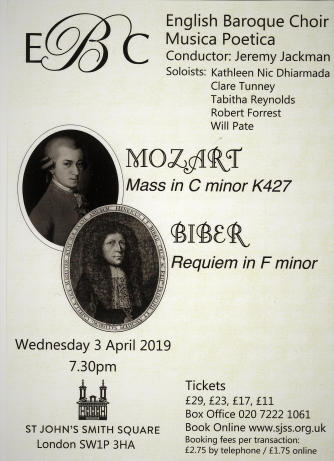Details
St John's Smith Square
Smith Square
City of Westminster
London
SW1P 3HA
England
Programme
Wolfgang Amadeus Mozart – Mass in C minor, K.427/417a
Heinrich Ignaz Franz von Biber – Requiem in F minor
Performers
Jeremy Jackman – Conductor
English Baroque Choir
Musica Poetica
Programme Note
The Church's loss is the Concert Hall's gain. Liturgically incomplete, the Great Mass in C minor cannot beautify a church service: but there is nothing incomplete about Mozart's artistic rationale in the music we have for K427. The work is conceived on a grand scale: the various tutti sections are more monument than movement: to different texts the music for soloists would grace any operatic stage (indeed, we are treated to colortatura solos, duets, a trio and a quartet): the orchestration is vivid and expansive. Jagged Baroque rhythms are complemented by dramatic louds and - particularly - softs. Mozart's intense study of the music of Bach and his contemporaries can be seen at the conclusion of Gloria, Sanctus and Benedictus. These movements are no mere nods to the necessity of writing a contrapuntal movement, these are powerful essays in the art of fugue.
Heinrich Biber is known to string players as the composer of some of the finest - and most difficult - music ever written for violin. But this Bohemian-Austrian composer also wrote major works for singers and orchestra, and the Requiem in F minor is one of the best of these. Scored for 5 soloists, chorus, trombones, continuo and strings in 6 parts, this is one of the greatest settings of the Requiem text written in the 17th century.

 Your events at Classical Events
Your events at Classical Events

